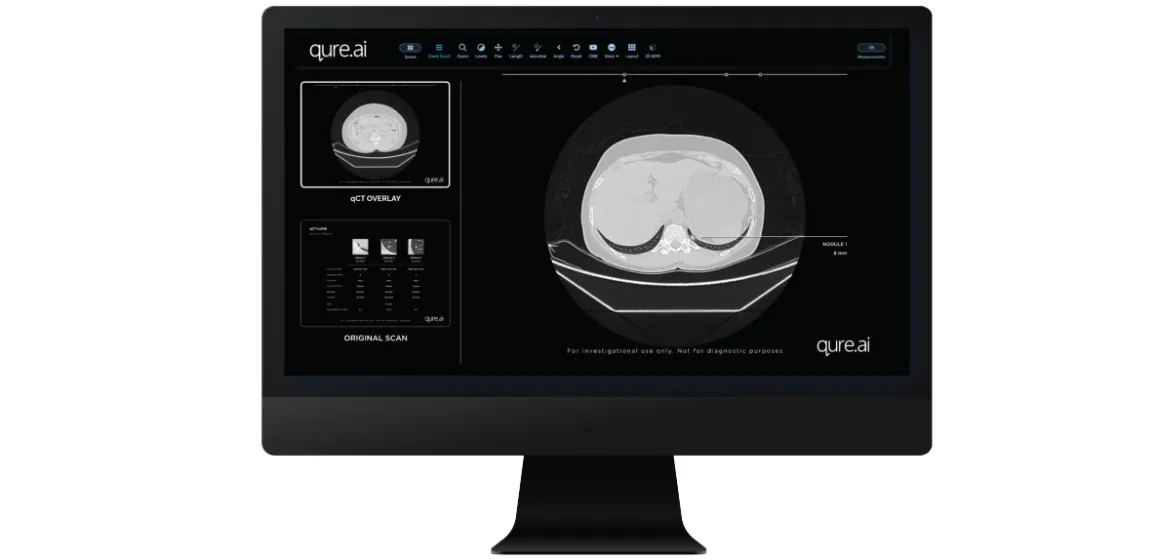Key Highlights

Back
- Over 20M Chest CTs are performed every year in the USA alone
- Every chest CT scan is a potential lung cancer screening opportunity
- Chest CT scanning increased significantly during the pandemic
- Qure.ai conducted a deep-learning study to use CT scans for COVID to screen for actionable nodules
Introduction
Jackson Brown, Jr. once said that nothing is more expensive than a missed opportunity. Lung cancer is perhaps the ideal example of this because incidental/early detection via opportunistic screening can play a significant role in helping to successfully combat the malady.
Lung cancer accounts for 1 in 5 cancer deaths yearly; the leading cause of cancer-related deaths worldwide. It accounts for the greatest economic and public health burden of all cancers annually; approximately $180 billion. This is also because the prognosis for lung cancer is poor compared to other cancers, largely due to a high proportion of cases being detected at an advanced stage where treatment options are limited, and the 5-year survival rate is only 5-15%.The global pandemic strained healthcare systems worldwide also leading to significant increase in the chest CT volumes.
“Earlier we would conduct approximately 300 chest CT scans per month. During the pandemic, this number rose to 7000 per month. It put a severe strain on doctors who must review every scan. Qure’s AI solution, qCT, made a significant difference to us by flagging missed actionable nodules on chest CT scans for further follow-ups & investigations.”– Arpit Kothari, CEO, bodyScans.in
“Earlier we would conduct approximately 300 chest CT scans per month. During the pandemic, this number rose to 7000 per month. It put a severe strain on doctors who must review every scan. Qure’s AI solution, qCT, made a significant difference to us by flagging missed actionable nodules on chest CT scans for further follow-ups & investigations.”– Arpit Kothari, CEO, bodyScans.in
The large volume of scans during the pandemic allowed Qure.ai to conduct a study using a deep-learning approach towards opportunistic screening for actionable lung nodules.
Methodology:
The study uses Qure.ai’s deep-learning approach to identify lung nodules on CT scans from patients who were scanned for COVID-19 from 5 radiology centers across different cities in India.
The scans were sourced from bodyScans.in, a leading radiology service provider in Central India and Aarthi Scans & Labs, yet another major diagnostic provider with 40 full-fledged diagnostic centers across India.
2502 scans were randomly selected from Chest CTs performed at 5 sites in two specialist radiology chains, Aarthi Scans and bodyScans during India’s 2nd and 3rd wave of Covid. They were processed by qCT, Qure’s AI capable of detecting and characterizing lung nodules. The radiologist report of the cases flagged by qCT were investigated for findings suggestive of cancer. Flagged cases for which the nodule was not reported were re-read by an independent radiologist with AI assistance on a web portal. They were asked to either confirm or reject the flag, rate the nodule for malignancy potential if confirmed or provide alternate finding if rejected (See Figure).
Results
- 2502 CT scans were processed in total.
- Of these, 23.7% were flagged by qCT and re-read by an independent thoracic radiologist.
- In 19.4% of these flagged cases, the radiologist agreed that there were unreported actionable nodules.
- There were 19 cases where radiologists did not rule out the risk of malignancy and 2 out of these were rated as probably malignant.
Conclusion
In the study, Qure.ai’s AI tool has assisted in reporting missed nodules which highlights the importance of opportunistic screening for identifying potential lung cancers early. The need to improve efficiency and speed of clinical care continues to drive multiple innovations into practice, including AI. With the increasing demand for superior health care services and the large volumes of data generated daily from parallel streams, streamlining of clinical workflows has become a pressing issue. In our study, by using AI as a safety net, we found 21 chest CTs that should have warranted follow-up management for the patients.
“Early detection plays a critical role in successfully treating Lung Cancer. Yet, there are several factors which contribute to the significant risk of these nodules getting missed in chest CT scans. Qure’s AI solution, qCT is immensely useful because it acts as a safety net; another pair of eyes to ensure that we clinicians can identify those patients who need immediate help. Eventually, AI can augment our efforts to defeat the disease.”– Dr. Arunkumar Govindarajan, Director, Aarthi Scans & Labs